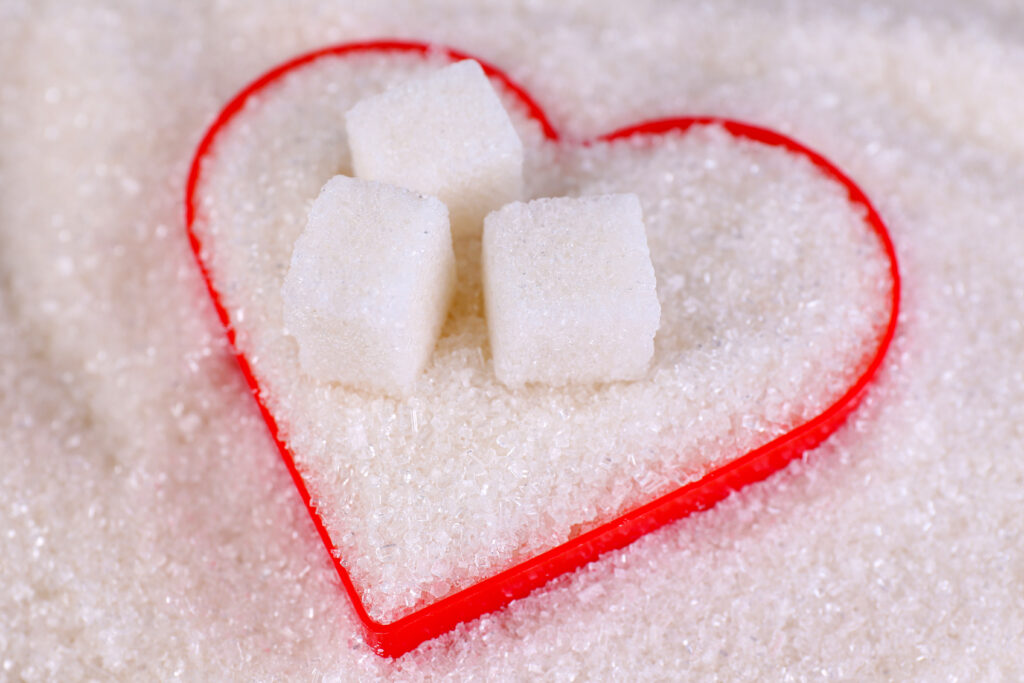In a world full of sugary temptations, a little goes a long way when it comes to your heart health. From the hidden sugars in seemingly innocent snacks to the well-known culprits like sodas and candies, let’s navigate the complex relationship between sugar and heart disease.
In this article, I’ll explore the ways in which excess sugar consumption can contribute to obesity, insulin resistance, inflammation, and increased triglyceride levels, all of which are linked to heart disease. Additionally, discover ways to naturally reduce your sugar intake to support optimal heart health.
Different Types of Sugars
Sugars can be broadly categorized into natural, added, and artificial, each with distinct metabolic pathways and health implications.
Natural Sugars
Natural sugars can be found in whole, unprocessed foods such as fruits, vegetables, and dairy products. These sugars, such as fructose (found in fruit) and lactose (found in milk), are often found in foods that also contain nutrients like vitamins, minerals, and antioxidants which can protect your heart from oxidative stress and inflammation.
Additionally, fresh fruits and vegetables also provide fiber which has been linked to improvements in blood pressure, blood lipids, and body weight.
Moreover, the presence of fiber in these foods slows down sugar absorption, preventing rapid spikes in blood glucose levels. Preventing blood sugar spikes can also help prevent insulin resistance, inflammation, and oxidative stress within the body, which can help reduce your risk of atherosclerosis and cardiovascular disease.
Added or Free Sugars
Added sugars, often referred to as free sugars, are the sugars that are added to processed foods and beverages. These sugars include sucrose (table sugar), high fructose corn syrup, and various other syrups and sweeteners.
Foods with added sugars are often lacking in essential nutrients and are typically void of fiber.
As a result, these sugars can cause a rapid spike in your blood glucose levels. Frequent blood sugar spikes can damage blood vessels, elevate blood pressure, and increase levels of blood fats, like triglycerides, all of which can increase your risk of heart disease.
Artificial Sweeteners
In an attempt to reduce sugar intake, you may turn to artificial sweeteners like Splenda (sucralose). While they provide sweetness without calories, recent research suggests a potential downside for your gut health.
One recent review found that certain artificial sweeteners, including sucralose and saccharin, may disrupt the balance of your gut microbiome by decreasing beneficial bacteria including Bifidobacteria, Lactobacilli, and Bacteroides. This bacterial imbalance can increase inflammation and decrease immune system function which can increase your risk for developing heart disease.
Sugar and Heart Disease
You may be wondering, “Is sugar bad for your heart?” as you take a closer look at what you’re eating and how to strike a balance between indulgence and heart health. Let’s dive into the complex relationship between sugar and heart disease.

Relationship between sugar consumption and risk factors for heart disease
Excessive sugar intake, particularly in the form of added sugars found in processed foods and sugary foods and beverages, has been linked to weight gain and obesity. High sugar intake often leads to an increase in overall caloric intake. This surplus of energy is often stored as fat, contributing to obesity, a significant risk factor for heart disease.
Furthermore, studies suggest that diets high in added sugar can lead to insulin resistance, a condition in which cells no longer respond effectively to insulin, the hormone responsible for regulating blood sugar levels. This can result in elevated blood sugar and insulin levels, which can lead to inflammation within your artery walls. Overtime, this inflammation can damage the artery walls, making them more susceptible to plaque build-up. Furthermore, this plaque build-up can contribute to blood vessel stiffness which can lead to increased blood pressure.
Influence of sugar on cholesterol and blood pressure
Excess sugar intake can significantly impact your cholesterol levels and blood pressure, both key indicators of heart health.
Consuming high amounts of added sugar can raise triglyceride levels in the bloodstream. These elevated triglycerides contribute to the formation of arterial plaques and prothrombotic events, leading to atherosclerosis, a condition where the arteries narrow and harden, hindering blood flow and increasing the risk of heart attacks and strokes.
You probably think of salt as the culprit for increasing blood pressure. However, studies show that excess sugar intake can also raise your blood pressure. Research has found that excess sugar consumption can lead to insulin resistance which can cause your kidneys to retain more sodium. Higher sodium levels can lead to increased fluid retention, raising blood volume, and subsequently, blood pressure.
The link between inflammation and sugar
Emerging studies have raised the question: Does sugar cause inflammation? Research has found that when you eat an excessive amount of added sugars, you can trigger a series of inflammatory responses within your body.
High sugar consumption has been linked to an increase in pro-inflammatory cytokines, small proteins that play an important role in cell signaling during immune responses. This chronic low-grade inflammation, often caused by a diet high in added sugar, is linked to various chronic diseases, including heart disease, diabetes, and obesity.
Moreover, excess sugar intake can also promote oxidative stress, a condition where there is an imbalance between free radicals and antioxidants in the body. Free radicals are highly reactive molecules that can damage cells and DNA.
When sugar metabolism produces excessive free radicals, it overwhelms the body’s natural defense mechanisms, leading to oxidative stress. This stress can promote damage to blood vessel walls, allowing cholesterol and other substances to accumulate and form plaques. These plaques can restrict blood flow and, in some cases, rupture, leading to heart attacks or strokes.
How Much Sugar Is Too Much?
We have a sweet spot for sugar that’s hard to ignore, with sugary snacks and beverages often taking center stage in the typical American diet. According to the American Heart Association, American adults consume approximately 17 teaspoons of added sugar each day. This is an astonishing 2 to 3 times more than the recommended daily amount.
Guidelines from The American Heart Association, advise that men should consume no more than 9 teaspoons (36 grams or 150 calories) of added sugar per day, and no more than 6 teaspoons (25 grams or 100 calories) per day for women. However, it’s important to note that sugars naturally occurring in fruits, vegetables, and dairy are not included in this limit, as they come with essential nutrients and dietary fiber.
Recommendations for Reducing Sugar Intake
Reducing your sugar intake is essential for promoting overall health, particularly heart health. One strategy to help cut back on your sugar intake is by exploring natural sweeteners as alternatives to refined sugar.
For example, replacing added sugar with natural alternatives like dates, applesauce, mashed bananas, or pumpkin in your favorite dessert, smoothie, or baked goods recipes can provide the desired sweetness without the drawbacks of processed sugars. Additionally, these natural sweeteners can add important nutrients and antioxidants to further support your heart health.
Opting for less processed, whole foods like fruits, vegetables, and whole grains can also help reduce your intake of added sugar. Whole foods not only provide essential vitamins and minerals; they are often rich in fiber which can promote healthy cholesterol levels and a healthy weight.
Furthermore, whole foods tend to be rich in antioxidants which can help reduce oxidative stress and inflammation all of which can reduce your risk of heart disease.
Working with a registered dietitian who specializes in heart disease will allow you to create a customized meal plan featuring recipes tailored to your lifestyle and taste preferences.
The Bottom Line
Having a deeper understanding of the impact of sugar and your heart health can help you make informed decisions about what you choose to eat and drink. Consuming an excess of added sugar can contribute to risk factors like obesity, diabetes, inflammation, and high blood pressure, all of which are precursors to heart disease.
Balancing your diet with whole, unprocessed foods like fruits, vegetables, and whole grains and swapping out refined sugar for natural sweeteners, you can make substantial strides in reducing your sugar intake paving the way for a heart-healthy future.
If you need support and guidance to optimize your heart health, I offer group programs and 1:1 counseling that address oxidative stress, insulin resistance, and inflammation providing a comprehensive approach to prevention and management of heart disease.
References
1. Reynolds, A.N., Akerman, A., Kumar, S. et al. Dietary fibre in hypertension and cardiovascular disease management: systematic review and meta-analyses. BMC Med 20, 139 (2022). https://doi.org/10.1186/s12916-022-02328-x
2. Del Pozo S, Gómez-Martínez S, Díaz LE, Nova E, Urrialde R, Marcos A. Potential Effects of Sucralose and Saccharin on Gut Microbiota: A Review. Nutrients. 2022 Apr 18;14(8):1682. doi: 10.3390/nu14081682. PMID: 35458244; PMCID: PMC9029443.
3. Faruque S, Tong J, Lacmanovic V, Agbonghae C, Minaya DM, Czaja K. The Dose Makes the Poison: Sugar and Obesity in the United States – a Review. Pol J Food Nutr Sci. 2019;69(3):219-233. doi: 10.31883/pjfns/110735. PMID: 31938015; PMCID: PMC6959843.
4. DiNicolantonio JJ, O’Keefe JH. Added Sugars Drive Insulin Resistance, Hyperinsulinemia, Hypertension, Type 2 Diabetes and Coronary Heart Disease. Mo Med. 2022 Nov-Dec;119(6):519-523. PMID: 36588634; PMCID: PMC9762218.
5. Rippe JM, Angelopoulos TJ. Relationship between Added Sugars Consumption and Chronic Disease Risk Factors: Current Understanding. Nutrients. 2016 Nov 4;8(11):697. doi: 10.3390/nu8110697. PMID: 27827899; PMCID: PMC5133084.
6. Dinicolantonio, James & Lucan, Sean. (2014). The wrong white crystals: Not salt but sugar as aetiological in hypertension and cardiometabolic disease. Open Heart. 1. 10.1136/openhrt-2014-000167.
7. Quesada O, Claggett B, Rodriguez F, Cai J, Moncrieft AE, Garcia K, Del Rios Rivera M, Hanna DB, Daviglus ML, Talavera GA, Bairey Merz CN, Solomon SD, Cheng S, Bello NA. Associations of Insulin Resistance With Systolic and Diastolic Blood Pressure: A Study From the HCHS/SOL. Hypertension. 2021 Sep;78(3):716-725. doi: 10.1161/HYPERTENSIONAHA.120.16905. Epub 2021 Aug 11. PMID: 34379440; PMCID: PMC8650976.
8. Ma X, Nan F, Liang H, Shu P, Fan X, Song X, Hou Y, Zhang D. Excessive intake of sugar: An accomplice of inflammation. Front Immunol. 2022 Aug 31;13:988481. doi: 10.3389/fimmu.2022.988481. PMID: 36119103; PMCID: PMC9471313.
9. Volpe, C.M.O., Villar-Delfino, P.H., dos Anjos, P.M.F. et al. Cellular death, reactive oxygen species (ROS) and diabetic complications. Cell Death Dis 9, 119 (2018). https://doi.org/10.1038/s41419-017-0135-z
10. How much sugar is too much? (2023) www.heart.org. Available at: https://www.heart.org/en/healthy-living/healthy-eating/eat-smart/sugar/how-much-sugar-is-too-much#:~:text=American%20adults%20consume%20an%20average,%2Dpound%20bowling%20balls%2C%20folks (Accessed: October 12, 2023).
